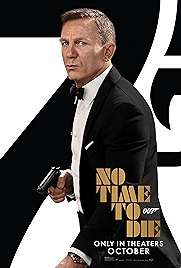A remembrance of Bonds past, No Time to Die is an evocative, elegiac farewell to Daniel Craig which also feels like a goodbye to the entire franchise – the familiar “James Bond will return” is there after the end credits, in case you need reassuring.
It covers a lot of ground, flicks a lot of synapses not normally flicked by a Bond movie and is fascinating from first to last. All of the Craig Bond movies have played about with the Bond formula one way or another, but No Time to Die seems to have gone one step further, as if it wants to run two Bond movies in parallel – the one we expect and a divergent one imagining what might have been for Bond had he got married and had a family.
Plot traditionalists, Bond groupies, don’t worry, it’s the usual. Bond is retired but is pulled back into play when a megalomaniac mastermind gets his hands on some nanobot technology which, in the wrong hands – and his are the wrong hands – spell death on a global scale. Cue exotic locations, chases by car, bike and chopper, explosions, tuxedos and martinis shaken not stirred, the Aston Martin, unwholesome chaps with thick foreign accents and mannered speech patterns, many attractive women, a couple of near-miss escapes all before the big finale in the sort of bunker-style lair that Bond villains favour.
And yet. Parallels, doubling and a “shadow Bond” narrative is in play from the outset. The pre-credits sequence which usually features Bond in a fix actually features Madeleine Swann (Léa Seydoux) as a child being menaced and eventually saved by Lyutsifer Safin (Rami Malek), the man who has just killed her mother. We cut to years later – Swann and Bond married and happy, and we remember, because Hans Zimmer’s soundtrack references All the Time in the World, theme to On Her Majesty’s Secret Service, that Bond was married once before… and that it didn’t last long.
And then, 25 minutes in, a second set of opening credits, this time with the Billy Eilish song – “Fool me once, fool me twice/Are you death or paradise?” – and the sense that we are being played with increases. There are two villains – Blofeld (Christoph Waltz) and Safin. There are two 007’s – Nomi (Lashana Lynch, a black woman, just to goad those on woke-watch) has taken on the double-O since Bond’s retirement. But there are also two Bonds – the familiar assassin doing it all for queen and country and a touchie-feelie Bond who takes death personally, actually has friendships with people and at one point is seen carrying a child. When this Bond gets shot, he bleeds.
The alternate James Bond timeline sketched out and then erased in On Her Majesty’s Secret Service is redrawn. We see the Bond we’re familiar with refracted through the Bond that might have been. The family man, lover and friend. Some people have even suggested that all this exhumation of the past is Proustian – there’s a key character in A la Recherche du Temps Perdu called Swann. Its narrator’s reveries were triggered by a madeleine. Bond is married to… Madeleine Swann. There’s an interesting collision of chatroom cultures right there.
The Proust stuff is probably a bit esoteric for some, and there is some collateral damage caused by all this backward-looking and shadowplay. There’s not an awful lot of action, for one, and rather a lot of shots of Craig pucker-lipped and wracked by emotion (the moue being to Daniel Craig what the eyebrow was to Roger Moore). Doubtless this is why Phoebe Waller-Bridge was drafted in, to add a bit of acid to the script by stalwarts Robert Wade and Neal Purvis, who wrote along with director Cary Fukunaga. Bond, meeting M (Ralph Fiennes) for the first time since he retired, quips: “Has this desk got bigger… or have you got smaller?” It’s one of hers, surely?
More grist for the woke-watch mill – Moneypenny (Naomie Harris) is more than just a secretary (just about), the “Bond girls” (a term that’s been retired) are all now highly competent operatives in their own right, not just bedwarmers, and Q (Ben Whishaw) is openly gay (so it stood for Queer all along).
Hans Zimmer plays a blinder with a score that ties it all together, the past and the present, the action and the inaction, the joyous and the tragic, but steps graciously back to let the film play out with a song we all know. Whether you like the film or not, you’ll probably get a bit teary. If this was the end of Bond, rather than just Daniel Craig, it would be a hell of a way to go.
No Time to Die – Watch it/buy it at Amazon
I am an Amazon affiliate
© Steve Morrissey 2021


